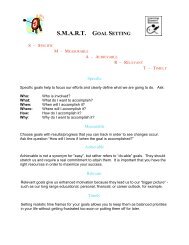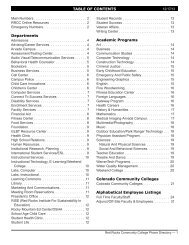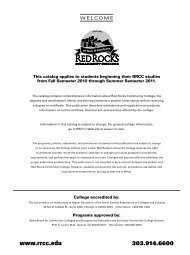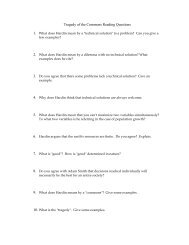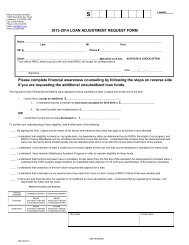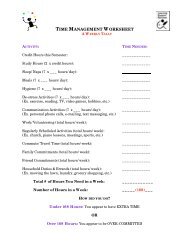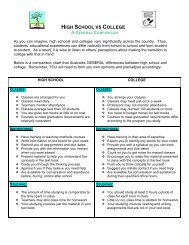opportunities, options, excellence - Red Rocks Community College
opportunities, options, excellence - Red Rocks Community College
opportunities, options, excellence - Red Rocks Community College
Create successful ePaper yourself
Turn your PDF publications into a flip-book with our unique Google optimized e-Paper software.
AHR 140 Residential Sheet Metal<br />
4 Credits<br />
This course is designed for those who wish to<br />
enter the HVAC trade. Students learn basic<br />
skills and knowledge required to work on<br />
installation of residential forced-air systems.<br />
Information covered in this course includes:<br />
tools, safety, materials, installation standards<br />
and practices. Layout and fabrication of sheet<br />
metal planners, transitions and fittings is a<br />
large part of this class. (Offered fall semester<br />
only)<br />
AHR 142 Servicing Forced-Air<br />
Systems<br />
4 Credits<br />
Prerequisite: AHR 103 and 105<br />
This course covers the operation, repair and<br />
maintenance of forced-air heating systems.<br />
The course studies the different types of furnaces,<br />
code requirements, common controls<br />
and mechanical problems. This course also<br />
explores the A.G.A. approved method of testing<br />
furnace heat exchangers. Customer relations<br />
and workplace behavior are discussed.<br />
AHR 145 Residential Air System<br />
Installation and Design<br />
4 Credits<br />
Prerequisite: Completion of AHR 140 with a<br />
grade of “C” or above or permission of<br />
instructor<br />
This course is presented in cooperation with<br />
the Denver Home Builders Association and<br />
<strong>Red</strong> <strong>Rocks</strong>. The focus of this course is on the<br />
installation, design and layout of residential<br />
forced-air systems and accessories. Topics<br />
include reading blueprints, installation of<br />
equipment and application of national standards<br />
and local codes.<br />
AHR 151 Low Pressure Steam<br />
Heating<br />
4 Credits<br />
Prerequisites: AHR 103, 105<br />
This course examines low-pressure steam systems,<br />
including boilers, piping, and heat convectors.<br />
Repair and maintenance of these systems<br />
is covered, as well as theory behind their<br />
operation. Boiler feed water and condensate<br />
systems are also discussed. (Offered spring<br />
semester, even years)<br />
AHR 162 Heating Controls<br />
4 Credits<br />
Prerequisite: AHR 105 or permission of<br />
instructor<br />
This course is an extension of AHR 105. The<br />
course applies the knowledge of basic electricity<br />
to controls related to heating equipment.<br />
This includes boilers and furnaces with<br />
emphasis on ignition and controls related to<br />
high-efficiency heating equipment. Course<br />
work includes reading and drawing ladder<br />
and schematic wiring diagrams.<br />
AHR 190 AC Systems Service and<br />
Repair<br />
4 Credits<br />
Prerequisite: AHR 105, AHR 110 or permission<br />
of instructor<br />
This course emphasizes the service of HVAC<br />
systems. Students will develop a preventative<br />
maintenance program for various types of<br />
equipment; both commercial and residential.<br />
Troubleshooting techniques and equipment<br />
repair and rebuilding are discussed.<br />
Additional time is spent on equipment<br />
change-outs, upgrading and retrofitting different<br />
refrigerants. (Offered spring semester<br />
only)<br />
AHR 194 Fundamentals of<br />
Pneumatic Comfort Controls<br />
1.5 Credits<br />
This course is intended to be an introduction<br />
to the subject of Pneumatic Comfort Controls.<br />
It is device oriented and provides a thorough<br />
treatment of those devices commonly utilized<br />
in Comfort Control Systemts including theory<br />
and basic operation of pneumatic thermostats,<br />
receiver-controllers, relays, dampers, valves<br />
and pneumatic actuators. Calibration, operation<br />
and preventive maintenance aspects of<br />
these components are highlighted.<br />
AHR 202 Pneumatic Controls<br />
4 Credits<br />
This course covers pneumatic controls and<br />
systems used in controlling commercial and<br />
industrial HVAC equipment. The course<br />
includes lab experimentation with pneumatic<br />
controls, rebuilding of valves and actuators<br />
and calibration of various types of controls.<br />
Students work with controls from most of the<br />
major manufacturers.<br />
AHR 203 Hydraulics Training<br />
1.5 Credits<br />
Whatever your fluid power applications, you<br />
can increase your knowledge of basic<br />
hydraulics, become a better troubleshooter<br />
and lower maintenance costs by attending this<br />
information packed course. Training stations<br />
are utilized in each training session. Cutaways<br />
of all major components are used in the sessions<br />
to visually demonstrate the components’<br />
construction and operation. Develping an<br />
understanding of “How” it works leads to an<br />
understanding of how and why it fails.<br />
AHR 204 Boilers: An Operators<br />
Workshop<br />
1.5 Credits<br />
This “operator-oriented” program has been<br />
designed to directly address the needs of<br />
those who have responsibility for the safe<br />
operation and maintenance, as well as the<br />
economics, associated with commercial and<br />
industrial boilers.<br />
AHR 206 Hot Water Heating<br />
Systems<br />
4 Credits<br />
Prerequisites: AHR 103, 105<br />
This course covers the theory of operation<br />
behind these systems, as well as installation,<br />
maintenance and repair. The course also<br />
examines air elimination, circulator pump and<br />
pipe sizing. Boiler and heat convector sizing<br />
are also discussed.<br />
AHR 208 Radiant Heating Systems<br />
4 Credits<br />
This course is a combination lab/lecture<br />
course and covers the theory of operation,<br />
installation and maintenance of warm- water<br />
radiant heating systems. Different methods of<br />
zoning, controls, piping methods, piping types<br />
and system components are discussed. Upon<br />
successful completion, students are able to<br />
design, install, document, maintain and troubleshoot<br />
all conventional residential warmwater<br />
radiant-panel heating systems.<br />
AHR 211 Stationary Engineer<br />
AHR 212 Boiler Operator<br />
AHR 213 Journeyman Steam Fitter<br />
AHR 214 Journeyman Boiler Maker<br />
AHR 215 Journeyman Heating and<br />
Ventilating<br />
2-4 Credits<br />
These courses cover the Uniform Mechanical<br />
Code and city codes where these certificates<br />
are required.<br />
AHR 216 Uniform Mechanical Code<br />
4 Credits<br />
This course reviews in detail the Uniform<br />
Mechanical Code. The course is intended to<br />
give those entering the HVAC/R trade, as well<br />
as those tradespeople taking certification<br />
examinations, a sound knowledge of this<br />
code.<br />
105 2002 - 2003 <strong>Red</strong> <strong>Rocks</strong> <strong>Community</strong> <strong>College</strong> Catalog



